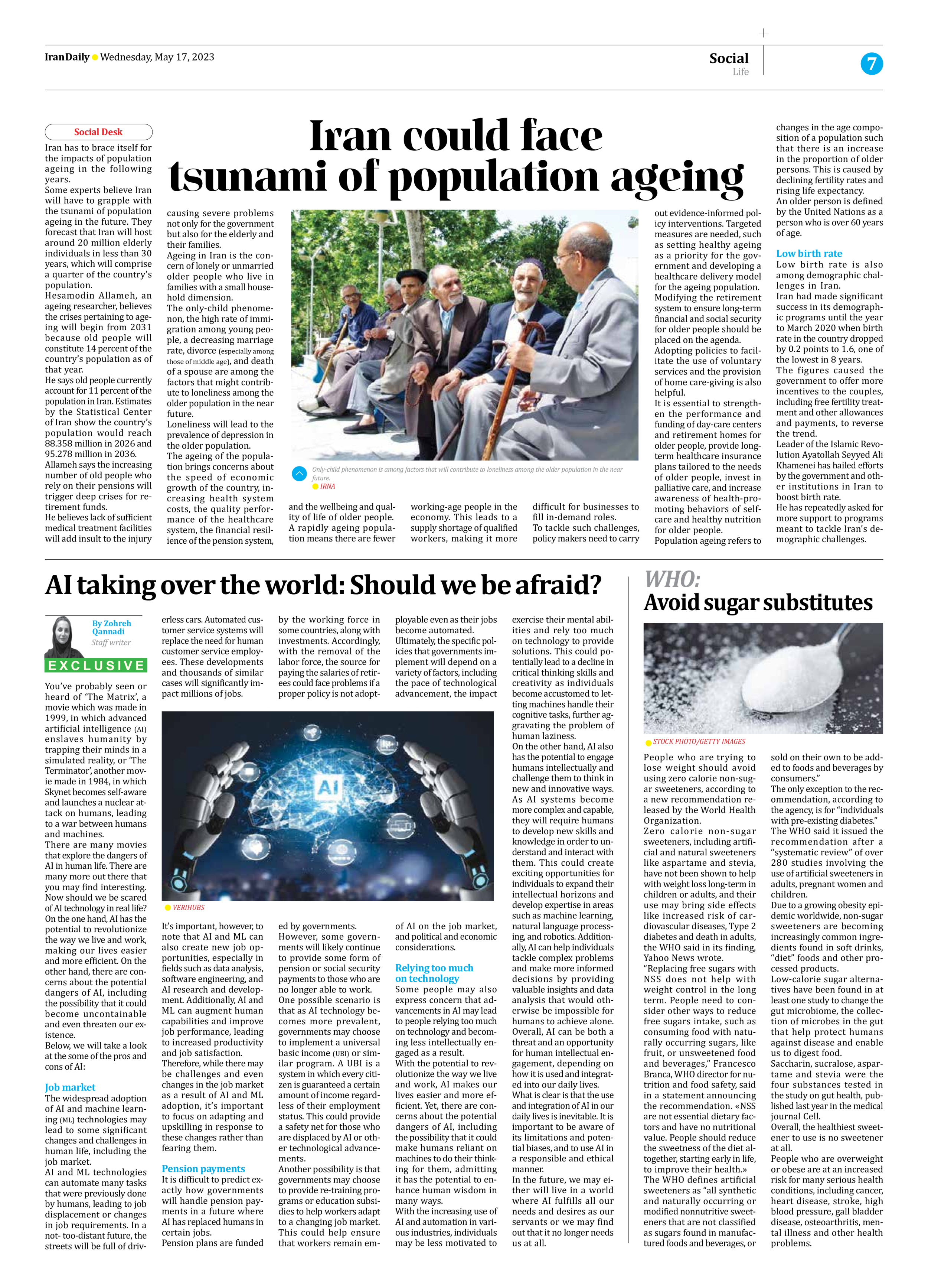
AI taking over the world: Should we be afraid?
By Zohreh Qannadi
Staff writer
You’ve probably seen or heard of ‘The Matrix’, a movie which was made in 1999, in which advanced artificial intelligence (AI) enslaves humanity by trapping their minds in a simulated reality, or ‘The Terminator’, another movie made in 1984, in which Skynet becomes self-aware and launches a nuclear attack on humans, leading to a war between humans and machines.
There are many movies that explore the dangers of AI in human life. There are many more out there that you may find interesting. Now should we be scared of AI technology in real life?
On the one hand, AI has the potential to revolutionize the way we live and work, making our lives easier and more efficient. On the other hand, there are concerns about the potential dangers of AI, including the possibility that it could become uncontainable and even threaten our existence.
Below, we will take a look at the some of the pros and cons of AI:
Job market
The widespread adoption of AI and machine learning (ML) technologies may lead to some significant changes and challenges in human life, including the job market.
AI and ML technologies can automate many tasks that were previously done by humans, leading to job displacement or changes in job requirements. In a not- too-distant future, the streets will be full of driverless cars. Automated customer service systems will replace the need for human customer service employees. These developments and thousands of similar cases will significantly impact millions of jobs.
It’s important, however, to note that AI and ML can also create new job opportunities, especially in fields such as data analysis, software engineering, and AI research and development. Additionally, AI and ML can augment human capabilities and improve job performance, leading to increased productivity and job satisfaction.
Therefore, while there may be challenges and even changes in the job market as a result of AI and ML adoption, it’s important to focus on adapting and upskilling in response to these changes rather than fearing them.
Pension payments
It is difficult to predict exactly how governments will handle pension payments in a future where AI has replaced humans in certain jobs.
Pension plans are funded by the working force in some countries, along with investments. Accordingly, with the removal of the labor force, the source for paying the salaries of retirees could face problems if a proper policy is not adopted by governments.
However, some governments will likely continue to provide some form of pension or social security payments to those who are no longer able to work.
One possible scenario is that as AI technology becomes more prevalent, governments may choose to implement a universal basic income (UBI) or similar program. A UBI is a system in which every citizen is guaranteed a certain amount of income regardless of their employment status. This could provide a safety net for those who are displaced by AI or other technological advancements.
Another possibility is that governments may choose to provide re-training programs or education subsidies to help workers adapt to a changing job market. This could help ensure that workers remain employable even as their jobs become automated.
Ultimately, the specific policies that governments implement will depend on a variety of factors, including the pace of technological advancement, the impact of AI on the job market, and political and economic considerations.
Relying too much
on technology
Some people may also express concern that advancements in AI may lead to people relying too much on technology and becoming less intellectually engaged as a result.
With the potential to revolutionize the way we live and work, AI makes our lives easier and more efficient. Yet, there are concerns about the potential dangers of AI, including the possibility that it could make humans reliant on machines to do their thinking for them, admitting it has the potential to enhance human wisdom in many ways.
With the increasing use of AI and automation in various industries, individuals may be less motivated to exercise their mental abilities and rely too much on technology to provide solutions. This could potentially lead to a decline in critical thinking skills and creativity as individuals become accustomed to letting machines handle their cognitive tasks, further aggravating the problem of human laziness.
On the other hand, AI also has the potential to engage humans intellectually and challenge them to think in new and innovative ways. As AI systems become more complex and capable, they will require humans to develop new skills and knowledge in order to understand and interact with them. This could create exciting opportunities for individuals to expand their intellectual horizons and develop expertise in areas such as machine learning, natural language processing, and robotics. Additionally, AI can help individuals tackle complex problems and make more informed decisions by providing valuable insights and data analysis that would otherwise be impossible for humans to achieve alone. Overall, AI can be both a threat and an opportunity for human intellectual engagement, depending on how it is used and integrated into our daily lives.
What is clear is that the use and integration of AI in our daily lives is inevitable. It is important to be aware of its limitations and potential biases, and to use AI in a responsible and ethical manner.
In the future, we may either will live in a world where AI fulfills all our needs and desires as our servants or we may find out that it no longer needs us at all.







